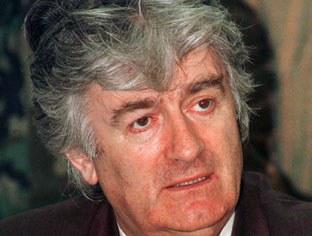Radovan Karadzic to boycott his trial
 The Hague - Radovan Karadzic will not be present at his first day of trial on October 26, the former Bosnian Serb leader informed the Hague-based war crimes tribunal on Thursday.
The Hague - Radovan Karadzic will not be present at his first day of trial on October 26, the former Bosnian Serb leader informed the Hague-based war crimes tribunal on Thursday.
In the letter revealed to Dutch media on Thursday, Karadzic, who is to face 11 counts of war crimes and crimes against humanity, including two counts of genocide for acts committed during the 1992- 1995 Bosnian war, said he had not been given enough time to prepare his defence.
The former Bosnian Serb president also told the International Criminal Tribunal for former Yugoslavia (ICTY) that he was "buried under one million pages" of material he had not yet been able to read.
"I hereby inform you my defence is not ready for trial, due to start on October 26. I will therefore not appear before you on that date," he said.
"I and my team will work on the preparations in the most intensive way," he added. "As soon as I am ready I will inform the chamber and the office of the prosecutor."
Since his trial was the "biggest, most complicated and sensitive ever taking place at this tribunal," Karadzic also wrote, it would constitute his "only crime" if he would start his trial under the current circumstances.
Previously, Karadzic unsuccessfully filed a motion to the appeals chamber requesting a 10-month postponement.
The war tribunal's rules of procedure determine that a defendant's presence in court is essential to constitute a fair trial.
The first defendant who refused to appear before the ICTY was Veselin Sljivancanin, a former lieutenant colonel of the Yugoslav People's Army who stood trial for his involvement in the Vukovar massacre.
On July 3, 2003 he refused to be present for his arraignment. The presiding judge then said he would have the former military "carried" to court if he would not walk by himself.
Sljivancanin was ultimately persuaded to appear before the tribunal. Bosnian Serb general Radislav Krstic, accused of genocide following the fall of Srebrenica, was absent during many occasions at his trial, due to medical treatment.
As he entrusted his lawyers with his case, the court subsequently reasoned he had given up his right to be present.
Karadzic however has not waived his right to be present, explicitly emphasizing his case was "so complicated" no lawyer could defend him properly.
Theoretically, the trial chamber could decide that Karadzic should not be permitted to obstruct justice and appoint an attorney to represent him in court.
The late Slobodan Milosevic who stood trial at the ICTY from 2002 until his death in 2006, also had an attorney appointed against his will. (dpa)